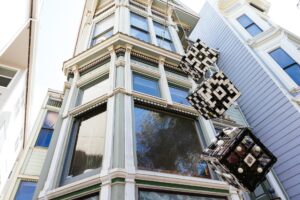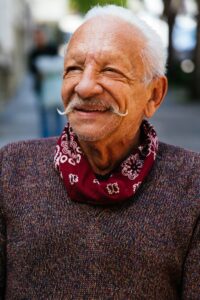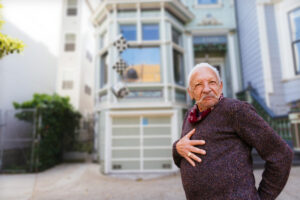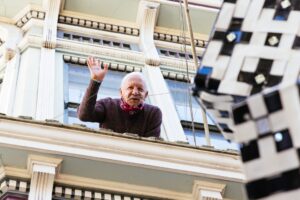
At Rosa Parks Pop-up Pantry, Miguel lights up when he starts talking about his art. He sets down his grocery bags and whips out his phone to show us his latest creation, hanging in front of his second story window: a mobile made entirely of syringes (with the needles removed, of course), that blows and gently spins in the breeze, while explaining: “I used to work for the opera, until I retired five years ago. I also made costumes for theatre groups, foundations and drag queens. I have a program going after I retired, [making] mobiles and artwork with the recycled materials I [find] on the street, thrown away.”
A Loss for the Community
Miguel is a longtime member of the arts scene in San Francisco, a gay man who’s been HIV+ for nearly 40 years, an activist, and a pantry participant since 2020 in his neighborhood of the Western Addition. He’s also one of roughly 101,000 CalFresh (known as SNAP federally) recipients in San Francisco who saw their grocery budget decimated overnight. This is due to the federal government’s decision to cut emergency allotments, which boosted CalFresh benefits by an average of $160 for recipients in San Francisco during the pandemic. That’s a loss of nearly $12 million a month in food assistance for our neighbors.
40 years, an activist, and a pantry participant since 2020 in his neighborhood of the Western Addition. He’s also one of roughly 101,000 CalFresh (known as SNAP federally) recipients in San Francisco who saw their grocery budget decimated overnight. This is due to the federal government’s decision to cut emergency allotments, which boosted CalFresh benefits by an average of $160 for recipients in San Francisco during the pandemic. That’s a loss of nearly $12 million a month in food assistance for our neighbors.
“I applied for the [CalFresh] benefits at the beginning of COVID. I was having a hard time with money. And it was very nice, especially when they started putting the extra funds in it,” Miguel told us. Miguel says he was receiving close to $200 during the pandemic, but after speaking with a CalFresh representative that same morning we met, he learned he’d be receiving just $23. That’s why the Food Bank Policy & Advocacy team is advocating to raise the minimum benefit to $50 in the state Senate this year – because for Miguel and many others, “it’s not worth going through all the [paperwork] trouble for $20.”
Meals are Best Shared
 For Miguel, his CalFresh benefits were a supplemental support that helped him stretch his budget and extend a little kindness to other friends who were struggling during the throes of the pandemic. “I was able not only to get things for myself, but I was able to invite friends to get food with me so we can have dinner together. I did it with two friends, maybe every two weeks. Eating alone is not really the best thing. Having company and being able to provide something a little extra, that was very nice. It really made a difference for me and my friends.”
For Miguel, his CalFresh benefits were a supplemental support that helped him stretch his budget and extend a little kindness to other friends who were struggling during the throes of the pandemic. “I was able not only to get things for myself, but I was able to invite friends to get food with me so we can have dinner together. I did it with two friends, maybe every two weeks. Eating alone is not really the best thing. Having company and being able to provide something a little extra, that was very nice. It really made a difference for me and my friends.”
In addition to dinners with friends, Miguel finds support through groups like the 50 Plus Network from the SF AIDS Foundation, which connects long-term HIV survivors through meetups and events. Miguel and his current housemate also stop by the Rosa Parks Senior Center most days for lunch, and utilize the Food Bank’s weekly pantries, where Miguel picks up groceries for them both: “The sweet potatoes are for my roommate, because he can’t come to the pantry – he’s disabled. So [the pantry] not only helps me, it helps someone else.”
A Positive Ripple Effect
As federal lawmakers strip proven poverty-fighting programs and safety nets from our neighbors, and leave food banks to pick up the slack, it’s essential that the Food Bank maintains access to the fresh produce, proteins, and grains that 53,000 neighbors rely on weekly to nourish themselves. “The benefit is greater than just food,” Miguel explained to us. “At my age, I don’t think there’s any stigma – I encourage other people to apply for these services. I have diabetes, so I have to be careful about what I’m eating. And besides the food, I can use the money [I save] on other things that are beneficial for my health or enjoyment. It’s a ripple effect; it magnifies your life in all these positive ways.”
leave food banks to pick up the slack, it’s essential that the Food Bank maintains access to the fresh produce, proteins, and grains that 53,000 neighbors rely on weekly to nourish themselves. “The benefit is greater than just food,” Miguel explained to us. “At my age, I don’t think there’s any stigma – I encourage other people to apply for these services. I have diabetes, so I have to be careful about what I’m eating. And besides the food, I can use the money [I save] on other things that are beneficial for my health or enjoyment. It’s a ripple effect; it magnifies your life in all these positive ways.”



Share